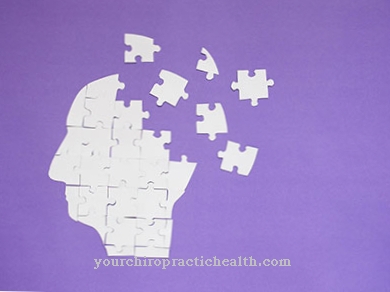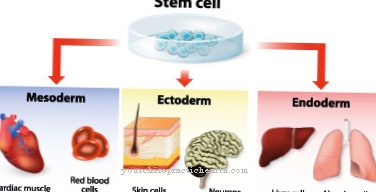Of course, everyone knows that one can bleed to death due to external injuries after a traffic accident. But even small internal bleeding that seeps over and over again can lead to considerable losses in the long run and is usually not noticed externally. The Bleeding anemia is the associated disease, which is characterized by anemia, weakness, pallor. Women with heavy menstrual bleeding are most commonly affected.
What is bleeding anemia?

© Dmitry - stock.adobe.com
Bleeding anemia is anemia that can be traced back to a chronic loss of blood from the surface of the body.
These blood losses can be visible externally, such as during menstrual bleeding, but can also take place hidden through the mucous membranes, such as in the case of easily bleeding gastric ulcers, colon cancer or diverticular bleeding of the intestine.
In the long run they lead to a lack of iron and red blood cells and to the typical symptoms of anemia, paleness, weakness and easy fatigue.
causes
One of the most common causes of bleeding anemia is the normal menstrual cycle in women. Although this is intended by nature and in no way pathological, it can, however, especially in small women, lead to a relevant loss of iron and cause the symptoms of anemia. The heavier the menstruation, the more severe the anemia, of course.
Furthermore, when anemia occurs with an unknown cause, the first thing a doctor thinks about is the possibility of colon cancer. Cancer sores can bleed easily and due to the mixing with intestinal contents and digestion by intestinal secretions, such bleeding in the stool is usually not noticeable.
Permanent blood loss due to a stomach ulcer that bleeds again and again or bleeding diverticula of the large intestine usually goes unnoticed and is only noticed when the anemia leads the person concerned to the doctor or, more frequently, accidentally jumps into the medical eye as part of a blood sample for another cause.
The intestine is therefore the main source of blood loss, but blood can also be lost via the urinary tract, in the case of chronic inflammation or tumor diseases (however, red urine is usually noticed here). With such permanent blood loss, blood production usually does not keep up and there is a shortage of red blood cells. In addition, most bleeding anemias are iron deficiency anemias.
This means that it is less the lack of blood cells than the lack of iron, which is contained in the blood cells as an important oxygen transporter, which causes the anemia if it is not replenished sufficiently by the diet.
Symptoms, ailments & signs
Bleeding anemia manifests itself through a variety of physical and mental symptoms. First of all, anemia leads to tiredness and listlessness. This is accompanied by mental deficits: There is a lack of concentration, a decline in performance and impaired consciousness. The bleeding anemia overloads the circulation, which can lead to symptoms such as rapid heartbeat and dizziness. In extreme cases, a circulatory collapse occurs.
Shortness of breath and chest tightness can also occur. Some sufferers complain of imbalance. Outwardly, anemia is shown by paleness and sunken eye sockets. The fingernails are often brittle and have white spots. Also typical are torn and inflamed corners of the mouth, which are usually very painful, as well as brittle hair and dandruff.
If iron deficiency occurs as a result of anemia, further symptoms such as diarrhea, constipation and flatulence can occur. The teeth and the oral cavity are also affected by pronounced anemia - this can lead to root damage, bleeding gums and other complaints. Anemia has no clear symptoms.
Nevertheless, it can be diagnosed based on the external characteristics and the decrease in performance. If there is no medical clarification, the symptoms mentioned can result in serious complaints, which usually lead to further complications.
Diagnosis & course
Symptoms of anemia are generally paleness, a feeling of weakness, reduced performance, long-term fatigue or easy fatigue. In addition, heart palpitations or palpitations can occur, and a doctor can also detect new heart murmurs by listening to the heart. The symptoms of bleeding anemia do not differ at all from the other forms of anemia.
Because these symptoms are all so non-specific and difficult to pin down, most people don't see them until very late. Anemias are therefore often delayed for a long time, which can be fatal, especially in the case of an underlying tumor disease.
A low hemoglobin level in a simple blood test tells the doctor that anemia is present. On the basis of the size of the red blood cells seen under the microscope, one can also get an initial indication of the type of anemia that may be underlying the event. In bleeding anemia, the red blood cells are of normal size (after all, blood formation is not the problem), but they are simply present in reduced numbers. In addition, an iron deficiency can usually be determined.
In women, such latent anemia is often due to menstruation. Larger deviations from the normal value or "sudden" onset in old age if the person concerned has never had anemia in their life should, however, still require further investigation. In older patients, this includes first of all a stool examination for hidden blood and then often a colonoscopy to rule out cancer or diverticulosis.
If nothing is found below, the search continues above: a gastroscopy provides information about possible blood loss due to the presence of gastric ulcers. Further special diagnostics can follow.
Complications
Bleeding anemia does not have to lead to immediate complications and restrictions. However, if the bleeding anemia is not properly managed, these can become noticeable over time. Those affected often complain of severe fatigue, a racing heart and dizziness.
In addition, there are difficulties with concentration and problems with the circulation. Most of the time, heavy physical work or sports can no longer be performed. The heart palpitations occur even though the patient is not exerting too much.
In most cases, people do not realize they have bleeding anemia, which usually makes the symptom worse. A tumor can also be the cause of the bleeding anemia. In most cases, bleeding anemia can be counteracted relatively well, so that there are no further symptoms.
The blood loss can be compensated for by taking iron supplements. However, it takes a few weeks for the amount of blood to return to normal. In the case of cancer, no predictions can be made; various complications can arise here.
If bleeding anemia occurs after an accident, it must be treated by a doctor. Often the blood loss due to the shock is not detected directly and is a very dangerous condition.
When should you go to the doctor?
A doctor should always be consulted with bleeding anemia. In acute bleeding anemia, a blood transfusion must often be given to compensate for high blood loss. If the anemia is chronic, it is imperative for the doctor to determine the cause of the bleeding. Often it is an occult bleeding, i.e. an internal bleeding that goes unnoticed. Acute bleeding anemia, on the other hand, is recognized quickly because there is an obvious loss of blood.
If the blood loss is very severe, it can lead to circulatory shock with life-threatening consequences. Therefore, emergency medical measures are often required here to avert a life-threatening situation. Chronic bleeding anemia can also have serious consequences and therefore also require a doctor's visit.
Since the cause of the complaints is often not immediately recognized here, a doctor's consultation is all the more urgent. The doctor should definitely be consulted if symptoms such as chronic fatigue, pale skin, dizziness, circulatory problems or even impaired consciousness occur.
In addition to bleeding anemia, these symptoms also occur in many other diseases and, regardless of their cause, should prompt those affected to urgently consult a doctor. Even if symptoms such as dry, itchy skin, torn corners of the mouth, canker sores, burning tongue, loss of appetite, brittle nails or diffuse hair loss occur, a doctor should be consulted. This combination of symptoms is a strong indication of chronic bleeding anemia to the doctor.
Doctors & therapists in your area
Treatment & Therapy
If the cause of the bleeding anemia is not found to be serious, the problem can often be corrected with a permanent iron intake. The daily supply in the form of tablets supports blood formation in the long term and ongoing losses, for example through menstruation, can be permanently compensated. The symptoms also improve after a few weeks.
In the case of cancer, gastric ulcer, or chronic inflammation, these naturally require treatment.
Outlook & forecast
Bleeding anemia is a severe loss of blood that can have a negative impact on a person's wellbeing. Since bleeding anemia can vary in severity, it is very difficult to make an accurate prediction.
If a person loses only a few milliliters of blood, this does not have a negative effect on well-being. Symptoms only appear when 30% of the total blood is lost. The affected person becomes very pale within a very short time and there is a strong feeling of dizziness. If there is external bleeding, it must of course be stopped. If this succeeds without any problems, the prospect of a full recovery and regeneration looks very good.
If the bleeding cannot be stopped by the person concerned, a doctor should be consulted as soon as possible. As soon as 50% of the blood is lost, there is an acute danger to life. Symptoms such as dizziness, nausea, vomiting or even fainting are threatening. In the worst case, vital organs can no longer be properly supplied with blood, so that high blood loss can lead to death. Early treatment by a specialist increases the chances of a complete and rapid healing.
prevention
Because there are a number of possible causes of bleeding anemia, it is difficult to take specific prophylactic measures. A healthy diet in moderation with sufficient fiber is certainly good advice to prevent bowel disease and tumors, but of course it never excludes sources of bleeding.
Anyone who discovers long-term fatigue and other signs of anemia should therefore consult a doctor in good time, as most causes of bleeding anemia can still be treated very effectively in the early stages.
Aftercare
In most cases of bleeding anemia, no special follow-up care is possible or necessary. The disease must be treated directly by a doctor, otherwise other complications and, in the worst case, death of the person affected can occur. As a rule, however, early diagnosis and treatment lead to a positive course of the disease and not to a reduced life expectancy of the patient.
Usually, the person has to rely on iron supplements to relieve symptoms and restore normal blood levels to the body. Patients should therefore ensure that they take the medication regularly, and parents in particular should force their children to take it.
Furthermore, a healthy lifestyle with a balanced diet has a positive effect on the further course of the disease.In the event of bleeding anemia, unnecessary exertion and other strenuous activities should be avoided as far as possible.
The person concerned should rest and take care of his body. Sports activities should also be avoided, as this can often lead to dizziness or loss of consciousness.
You can do that yourself
If bleeding anemia, or the bleeding underlying the anemia itself, does not require immediate medical treatment, there are quite a few resources that the person can use to help themselves. First of all, combating the causes, i.e. stopping internal or external bleeding, is important. This can be done externally primarily by carefully closing the wound and protecting the affected area.
If bleeding anemia is caused by (often chronic) bleeding inside the body, there are also methods to stop it. In addition to medical medication, a bleeding gastric ulcer often also requires a change in behavior, including avoiding nicotine, alcohol, coffee and spicy foods. Reducing stress levels can also help. If the patient is bleeding from hemorrhoids, a diet rich in fiber, sufficient amounts of water to drink and home remedies such as psyllium husks can eliminate the symptoms and thus the cause of the anemia.
Consistent drinking of water and tea is also important to compensate for a lack of fluid in the body caused by blood loss. To improve blood values (especially ferritin and hemoglobin), an iron cure with dietary supplements or over-the-counter iron supplements can be used. In this context, vegetarians will also find preparations on the market that are free from gelatine. The success of these measures can be checked by having a regular blood count at the attending physician.




.jpg)



















.jpg)



